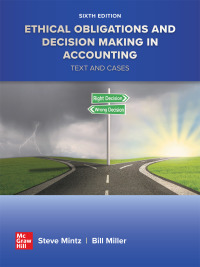In what some are suggesting is the worst financial reporting fraud since Enron, Wirecard filed for bankruptcy
Question:
In what some are suggesting is the worst financial reporting fraud since Enron, Wirecard filed for bankruptcy in June of 2020 after admitting that €1.9 billion Euros ($2.1bn U.S.) on its balance sheet (representing roughly 25% of its total assets) probably did not exist.
The fraud appears to have been going on since 2015 with Wirecard recording billions of Euros of fabricated revenue. It has been reported that Wirecard used a technique known as round-tripping to accomplish this deception. Roundtripping is a process by which money and/or assets are moved between entities and end up back in the hands of the entity they originated from (completing a roundtrip). This is done to make it appear as if real economic transactions are actually taking place when they are not.
EY, Wirecard’s auditor of over 10 years, has claimed responsibility for bringing the fraud to light in 2020, as a result of their 2019 audit work. When the dust finally settles, that claim may be found to be technically true, but one has to question why the fraud was not caught sooner, given both the magnitude of the fraud and the fact that questions about potential financial irregularities at Wirecard became a matter of public record as early as 2015 when the first of a series of articles was published by the Financial Times.
Carmine di Sibio, Global Chairman and CEO of EY, issued a memo in 2020 to EY partners apparently written to help mitigate client fallout over this audit where he apologized for not uncovering the fraud sooner. The memo also states the following regarding EY’s involvement in the Wirecard audit:
“The collusive acts of fraud at Wirecard were implemented through a highly complex criminal network designed to deceive everyone—investors, banks, supervisory authorities, investigating lawyers, and forensic auditors, as well as ourselves” and, “The public interest clearly requires that much more be done to detect fraud at its earliest stages.”
EY is currently under investigation by German regulators who are questioning the quality of their work on the Wirecard audit. On July 2, 2020, Kate Beioley and Amy Bell reported that “People with first-hand knowledge told the Financial Times that the auditor between 2016 and 2018 did not check directly with Singapore’s OCBC Bank to confirm that the lender held large amounts of cash on behalf of Wirecard. Instead, EY relied on documents and screenshots provided by a third-party trustee and Wirecard itself."
The above quote, from the Financial Times, appears to have been corroborated by an audit partner at KPMG, Alexander Geschonneck.9 KPMG was hired to investigate the irregularities at Wirecard claimed in the Financial Times article. In speaking to German regulators, Geshconneck suggested that EY should have spotted the fraud earlier. He stated that the work that KPMG did was not rocket science, it was just work that had not been previously been performed by EY. However, EY claims that they did this work, but were fed fabricated information including fraudulent bank confirmations and noting the need for innovative techniques and processes moving forward to catch fraud of this scale.
The Financial Times article states, that in his memo, Sibio committed to making the following changes at EY as a result of what happened at Wirecard:
• Increase the amount of technology it uses to improve its audits including electronic confirmations for audit evidence and matching the company’s records with those obtained by the banks.
• Increase the amount of third-party data collected during the audit.
• Increase the amount of checks it does surrounding management integrity.
• Require all EY personnel be given annual forensic accounting training.
The memo does not appear to have addressed the revenue side of the transaction, nor what work was done or should have been done to validate that revenue. In addition, some are now questioning whether EY was aware of the fraud sooner than they have indicated. On October 1, 2020, the Financial Times reported that in 2016 an internal whistleblower at EY had reported potential fraud at Wirecard and an attempt to bribe EY staff in India.
Questions
1. Discuss whether you believe that EY performed its audit of Wirecard in accordance with GAAS. Identify specific requirements of GAAS in your response to support your position, referencing both risk assessment and audit procedures.
2. Discuss the changes that EY indicates they will be making to improve its audit quality as a result of what occurred at Wirecard. Do you believe these changes will make a difference in how EY conducts its audits?
Step by Step Answer:

Ethical Obligations And Decision Making In Accounting Text And Cases
ISBN: 9781264135943
6th Edition
Authors: Steven Mintz





